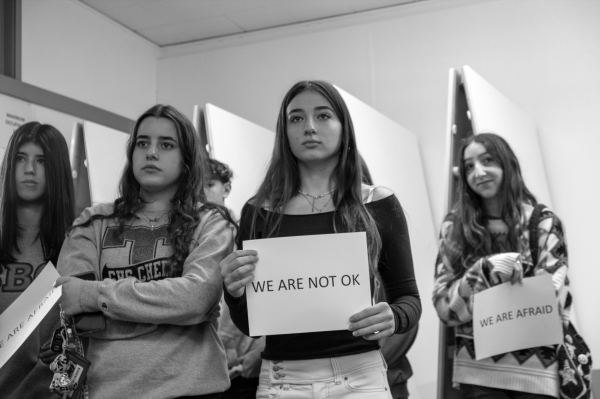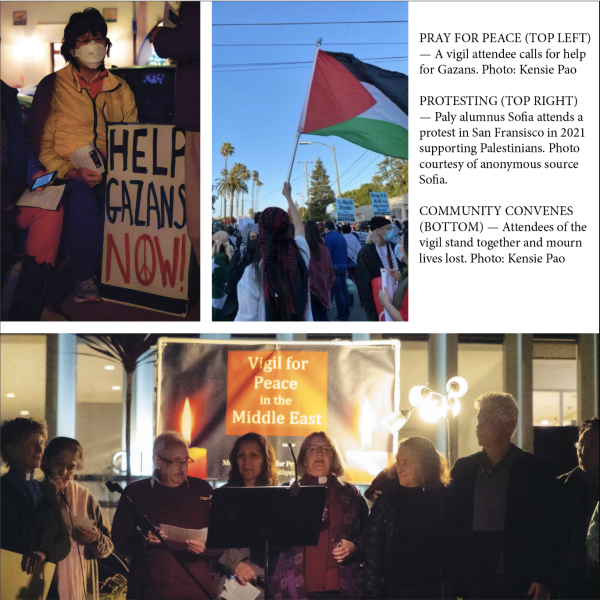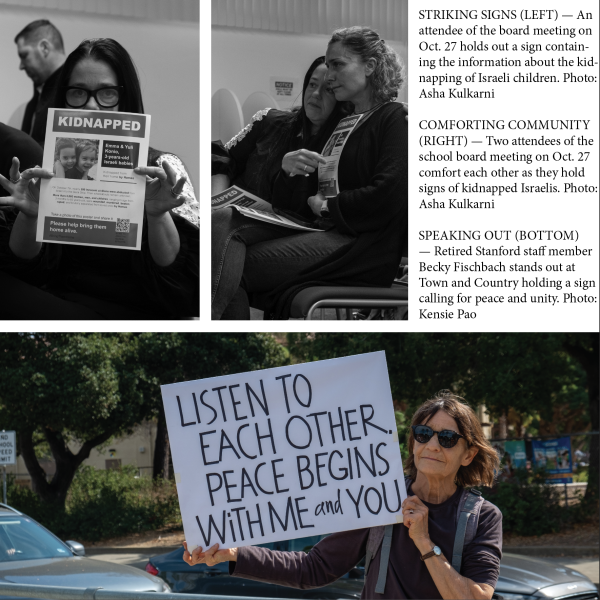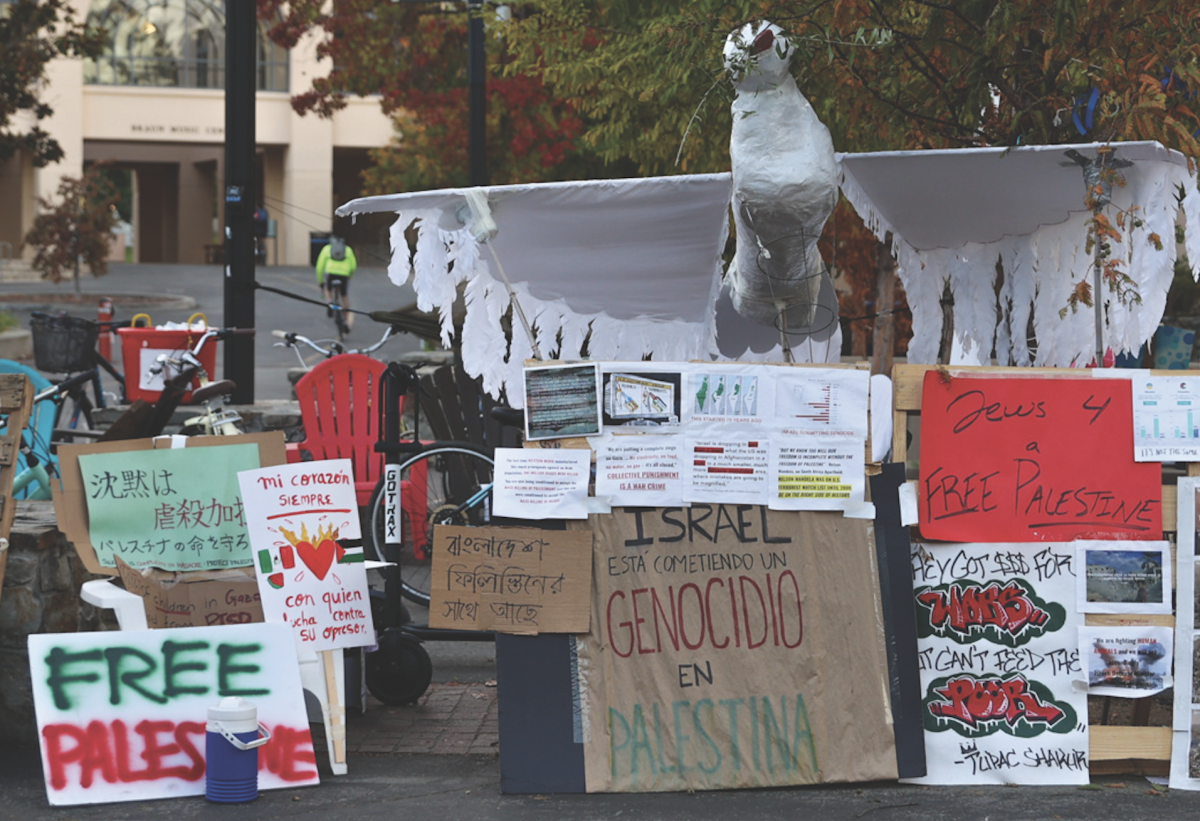It was 1 A.M. on Oct. 8. Palo Alto High School sophomore Ella Segev had just come home from the homecoming dance when her dad pulled her aside and told her what had happened in Israel that day.
“I didn’t realize how bad it really was until the next day, where I woke up and the first thing my dad said was ‘Look, come right now,’” Segev said. “My whole family was sitting in the living room watching the news … It was just one of the most horrific things I’ve ever seen.”
What the family was watching was Hamas’s attack on Israel, wherein an estimated 1,200 Israelis were killed and 242 were taken hostage, according to the New York Times. Since Oct. 7, only four hostages have been released and one rescued, as of early November.
The family was alarmed by watching soldiers and paramedics share their experiences. For the Segev family, the news was personal. Ido Segev, Ella’s father, was born in Israel and lived there until he was 35, attending university, getting married and serving in the military there. Ella was raised there and her extended family on her dad’s side still lives there, with Ido’s brothers currently serving in the military.
“We pray every night that they [the family in Israel] will be safe with no harm,” Ido said. “My brothers that are in the army have wives and kids waiting for them to return back home and be okay.”
Ella’s cousin and best friend Noa lives in northern Israel and according to Ella, has been living in constant fear since the war began. For Noa, alarms notifying people to go into bomb shelters now sound up to three times a day. In a phone call with Ella, Noa described one of these incidents.
“I was scared for my life,” Ella recalls her cousin telling her. “I don’t think I’ve ever run that fast in my life, Ella. The bomb that we heard wasn’t near us, but this is the reality we live in.”
However, the Segev family is just one of many living in Palo Alto with personal connections to the Middle East. When the news of the Oct. 7 Hamas attack on Israel hit, we knew that some members of our community would have their lives changed forever. The Israel-Hamas war has inflicted unbelievable trauma on people from various backgrounds in our local community. Since then, Verde has reached out to local families and organizations directly affected by the war to shed light on their experiences.

Emotional impact
Heartbreak and terror. That was what Paly alumnus Sofia said she felt when she first heard about the Israel-Hamas conflict. As the conflict went on and the violence grew, Sofia, whose name has been changed to protect her identity, said she started to become more affected by it.
“I felt the impact as the days went on,” Sofia said. “It [the conflict and violence] just became more and more severe and at the same time, the way I felt about it became more and more emotional.”
Sofia said she is aware of the history and context that has led up to this conflict and though she is appalled, she is not shocked at the way events have been playing out.
“As someone who has seen what Palestinians have gone through and has seen their exilation and the massacres imposed on them since the creation of Israel, it really wasn’t surprising to me that at one point there would be backlash against an occupying force,” Sofia said.
Sofia holds a personal connection to Palestine: Her husband is from Palestine and much of his family lives in Jerusalem. Additionally, as a Muslim, she feels a deep connection to Palestine, which is majority-Muslim.
“I’ve grown up with being best friends with Palestinians,” Sofia said. “I feel like I felt that [connection with Palestine] personally in that level as well.”
Contrasting opinions on the Israel-Hamas war have caused issues between Sofia and her colleagues. Sofia said she has seen people take sides on this topic without really knowing why or understanding the implications of their position.
“It [the conflict] definitely has made an impact … on my relationships with colleagues in medical school and even with [medical school] administration, who are very one-sided about this issue and refuse to really speak about what Palestinians are going through,” Sofia said.
Students with connections to both Israel and Palestine have expressed the emotional toll this war has taken on them. Paly senior Alma Samet, who is an Israeli Jew, has a close cousin who has been called to serve in the Israeli military.
“His name could be on one of the news headlines about hostages or casualties, so that’s kind of scary,” Samet said. “It’s really a scary situation to always be frightened for your family and not knowing if they’re going to be okay.”
Sofia said the Israel-Hamas war has caused her and all the people around her to be in a constant state of distress.
“I’ve had friends who’ve lost family members who’ve had their family members killed … I am worrying about my family, or my husband’s family in Palestine,” Sofia said. “Just waking up and knowing that this is going on and that people are being massacred right and left, it’s obviously … taken a huge toll on my mental health.”
Sofia said she believes that U.S. citizens are under the impression that this violence is only an issue in the Middle East and that the U.S. is too far away from it to be affected.
According to Sofia, the most important thing that individuals can do is educate themselves and speak out against oppression. Sofia finds people keeping silent or ignoring the violence in Palestine to be very disheartening. Sofia said that because the Israel-Hamas war has conjured up a lot of hate, spreading the right information is key.
“If people want to post about the issues of antisemitism, for example, or Islamophobia, I think that it’s necessary to talk about the valid facts, rather than just spewing hate with no basis,” Sofia said.

Community vigil
As a response to the Israel-Hamas war, Palo Alto organization Multifaith Voices for Peace and Justice hosted a vigil at King Plaza on Nov. 11 to stand with creating peace and to mourn those who have died in the war. Samina Sundas, a Muslim committee member of Multifaith Voices for Peace and Justice, said that she has felt horrified and devastated watching the violence unfold overseas.
“It’s just very painful,” Sundas said. “Very raw, very painful. We pray five times a day and I cry at least five times.” Sundas said she has chosen to work with the community to cultivate peace.
“After 9/11, there was so much hate against Muslims,” she said. “I decided that I’m not going to hate anybody. The best thing I can do is just free people and bring them together and say, ‘Let’s sow the seeds of friendship.’”
Farha Andrabi, president and co-founder of the Mountain View-Palo Alto Musalla (a space apart from a mosque, mainly used for prayer in Islam), said she is horrified by the events.
“What’s happening, it’s just horrific,” Andrabi said. “Even thinking about it [the war] makes me feel constricted, that I cannot read properly when thinking about it. But I believe in hope through God. It gives me great peace.”
Andrabi said that she hopes events such as the vigil can help combat Islamophobia.
“We [Muslims] are not a violent community,” she said. “We’re not the stamps and stereotypes that have been imposed on us. We’re just like any ordinary American. We just as much hope for peace and our family. We share our common humanity with everyone else.”
Naiel Chaudry, a freshman at Mountain View High School who sang at the vigil, also said the emotional impact of the war has been difficult.
“Lots of our family members are Palestinian,” Chaudry said. “I remember one of our close family friends, she said just yesterday, she had lost 100 of her family members in Palestine. Every day it just keeps adding more and more.”
The events in the Middle East have been difficult to watch for Chaudry’s family.
“Since Oct. 7 … all of that just made everyone in our family really emotional and really sad, especially whenever we hear on the news or on social media platforms,” Chaudry said.
Diana Gibson, convener for Multifaith Voices for Peace and Justice, said the message of unity at the vigil was powerful.
“[The most difficult thing for the event] was to find … the strength of what we could all say together,” she said. “I think that’s where the seeds of peace are. We all care about our children. We all love them deeply. … So we had to find that common place.”
Not only do many community members fear for their communities in the Middle East, but many fear for their safety where they live.
“These days I would not feel comfortable to put an Israeli flag on my porch facing the street because I have concerns that someone may decide to hurt us and that’s not okay,” Ido said.
He also expressed his concerns for the safety of his three kids in the Palo Alto Unified School District. Despite the large Israeli community in Palo Alto, Ido said that his kids don’t always feel free to voice their opinions at school.
“They [his kids] walk in school and people go up to them, shouting horrible things at them, so of course this is antisemitism,” Ido said.
Sarah Benson, an Israeli citizen and mother of two kids attending PAUSD, said she also worries for her children.
“My community is under threat,” she said. “We’ve been experiencing a lot of increase in antisemitism and that’s something that has alarmed me as part of my concern for the safety of my children.”
At an Oct. 27 PAUSD board meeting, Zack Bodner, the CEO of the Oshman Family Jewish Community Center in Palo Alto, encouraged the school board to condemn antisemitism.
“One Israeli woman is having her daughter wear a cross because she’s scared,” he said. “The only difference between now and 1930s Germany for our families is you [the school board].”
At the meeting, the board passed two resolutions condemning Islamophobia and antisemitism and calling for unity. PAUSD parent and teaching assistant Soumaya Arfi said she hopes the resolutions will improve student safety.
“I think people felt they needed to hear something from the school board to bring safety to their families or to feel safe,” Arfi said. “I hope that … what’s to come is things the district can do to bring healing and to bring in communication and conversation for students so that they can learn how to navigate these types of situations.”

Media
According to a Paly junior who will be referred to as Nick, there have been violent threats posted on social media, usually directed towards supporters of Palestinians.
“There’s people on Instagram posting stories saying that if you support Palestine you’re a terrorist and you support the killings of innocent civilians,” Nick said.
Samet said she believes that people should feel no obligation to post, considering the false information being put out into the media.
“I also believe that people shouldn’t feel pressured into posting about activism on social media, especially when they’re not educated about topics,” Samet said.
According to Nick, who is of Middle Eastern descent, he and his family are both very distraught over how this conflict has been portrayed. He said he thinks the U.S. media tends to skew more in Israel’s favor.
“People will show statistics about what’s going on in Israel right now, but then not say anything about the context,” Nick said. “So they won’t talk about the 70 years of history of Israel discriminating against the Palestinian people.”
Nick said he believes that this is misinformation and is rooted in racism towards Palestinian people. Nick compares the media’s support of the Ukraine-Russia conflict compared to the Israel-Hamas war.
“It seems like one of the biggest differences [in the level of support] is just the color of their skin and the connotations of the Middle East and the people who live there,” Nick said.
Taking action
The Segev family, according to Ella, fears for the safety of close family and friends. Ella said she has no way to contact some of her friends in the military.
“We can’t text them because the signal on their phone can show the opposing forces where they are,” she said. “This is crazy how this is happening to people I know. It’s scary to think about how those that are being murdered and kidnapped could be my family.”
The feeling of uncertainty has been unbearable for her family.
“My mom would see stuff [the news] on TV and she wouldn’t stop crying,” Ella said. “Seeing your parents that raise you and protect you start crying because of something on the news is a different feeling.”
Ido and Ella have funneled their feelings into activism. Ella has created an online fundraiser for the Israeli charitable organization American Friends of Magen David Adom and hosted
information nights to educate people about the conflict through the B’nai B’rith Youth Organization, a Jewish organization she is part of. Ido has gone to protests and spoken at events hosted by Jewish community groups.
Ella said: “I care so much about Israel, so when it’s in danger I’m going to do everything in my power as a 15-year-old student at Palo Alto High School to help from here.”



